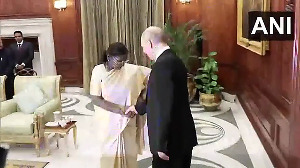With a spurt in incidents of honour killings across the country, the government on Thursday decided to set up a Group of Ministers to consider amendments to the law to deal with the issue and said the bill for that will be brought in the monsoon session of Parliament.
The government's move indicates differences within the United Progressive Alliance over introducing stricter laws to deal with honour killings. Many senior leaders are apprehensive about such changes angering rural voters in Punjab and Haryana, where Khap panchayats wield immense clout.
At the Cabinet meeting held on Thursday morning, Union Human Resource Development Minister Kapil Sibal, Sports Minister MS Gill, Surface Transport Minister Kamal Nath and other senior ministers in the Cabinet protested against Home Minister P Chidambaram's decision to bring in the Khap bill without consulting any of the state governments.
According to a Union minister, Sibal pointed out during the meeting that the issue was a sensitive and emotional one for north Indian states. He reportedly urged the Cabinet to consider the sentiments of the rural populace of Haryana and Punjab before taking any decisions.
"The government wants amendments to be brought to the Parliament in the monsoon session," Information and Broadcasting Minister Ambika Soni told reporters after the meeting of the Union Cabinet in New Delhi.
Apart from a Group of Ministers which would be set up to consider amendments to the law to deal with honour killings, views will also be sought from states to the proposed amendments, Soni said. "The so-called honour killings have to be brought under the ambit of the law of land," she said.
"Consultations will be completed well before the monsoon session is over," Home Minister P Chidamabaram added. The amendments will seek to bring honour killings under the definition of murder by amending the IPC. It would also seek to amend the Indian Evidence Act which would bring the onus on Khap panchayats to prove their innocence in any such case.
The Khap Panchayat (caste council) or any group ordering honour killings and any person who carries out the diktat will be jointly liable for punishment under the proposed legislation.
The government also plans to do away with the 30-day notice period under the Special Marriage Act for inter-caste and inter-religion marriages. Taking note of the recent spurt in 'honour' killings, the Supreme Court had in June sought a response from the Union government and eight states on the steps taken to prevent such incidents.
The GoM will take a greater and in-depth look at the proposals, Soni said, adding that the terms of reference of the GoM would be decided when it is set up by the prime minister. She said there was 'urgency' to bring about changes in the law to deal with the "so-called honour killings".
"We do feel the pressure to bring the amendment in the monsoon session of the Parliament," she said.
"There is not only social pressure, not only media pressure but within our own Cabinet and party, we feel that the so-called honour killings have to be brought under the ambit of the law of the land and how best this can be done," Soni said.
It was decided to hold wider consultations and seek opinions of state governments before the law is amended, she said.
Later, Chidambaram said the government's intention is to introduce the amendment bill in the monsoon session.
"Consultations will be completed well before the (month-long) monsoon session is over and views of the state government (will be) placed before the Cabinet," he said.
Additional inputs from PTI





